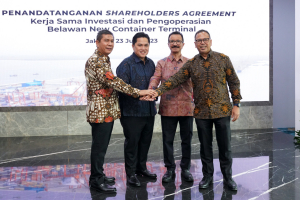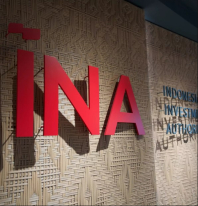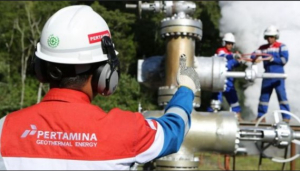Chandra Asri and INA develop chlor alkali plant for EVs industry
PT Chandra Asri Petrochemical Tbk (Chandra Asri), Indonesia's largest integrated petrochemical company, and the Indonesia Investment Authority (INA), have signed a Memorandum of Understanding (MoU) on collaboration to develop a world-scale chlor-alkali plant in Indonesia.
Masyita Christallin spokeswoman of INA said that INA, along with other potential international investors, will be taking shares of PT Chandra Asri Alkali (CAA) as a form of investment in the developmentment of the chlor-alkali plant.
" Once operational, the plant will produce more than 400,000 metric tons of caustic soda anually (also known as sodium hydroxide), and 500,000 metric tons of ethylene dichloride (EDC) annually," Christallin said in a statement on April 16,2023 .
As part of the accelerated development of the new plant, Chandra Asri has signed a basic engineering and licensing agreement with Asahi Kasei Corporation (AKC) from Japan, a world- class leading licensor with state-of-the-art intellectual property for the development of the chlor-alkali plants.
The Chief Executive Officer of INA, Ridha Wirakusumah said that the collaboration aligns perfectly with the institution's prioritized investment theme to support the downstreaming of the nickel value chain – a critical component for the development of the electric vehicle industry.
"By working together, we aim to significantly reduce Indonesia's import dependencies of Caustic Soda and bolster our nation's economic resilience. Chandra Asri's market leadership and demonstrated expertise make them an ideal partner for INA to execute this project. This partnership is a testament to our shared commitment to fostering a sustainable and prosperous future for Indonesia." Ridha added.
The President Director and CEO of Chandra Asri, Erwin Ciputra, said that the downstream asset investment is in line with the company's core strategy of achieving transformational growth via PT Chandra Asri Perkasa (CAP2).
"Our second world-scale petrochemical complex. As a core component of the total CAP 2 portfolio package, this chlor-alkali plant will help meet Indonesia and South-East Asia’s growing needs for caustic soda and EDC. We are delighted to explore this opportunity with INA that will reduce Indonesia’s imports and boost the nation’s exports, in a meaningful and sustainable way.” Erwin explained.
Caustic soda is a critical input for Indonesia’s growing downstream industries, such as alumina extraction, nickel extraction, water treatment, textile production, pulp and paper production, as well as soap and detergent production. Ethylene Dichloride is a core intermediary chemical input to produce polyvinyl chloride (PVC), which is widely used in numerous end-use applications including construction and packaging.
This investment clearly supports Indonesia’s ambitions as one of the world's largest nickel producers, to position itself in the global electric vehicle value chain to meet the growing needs for caustic soda, as growing worldwide electric vehicle adoption will drive demand for nickel, a key battery material.
Already have an account? Sign In
-
Start reading
Freemium
-
Monthly Subscription
30% OFF$26.03
$37.19/MonthCancel anytime
This offer is open to all new subscribers!
Subscribe now -
Yearly Subscription
33% OFF$228.13
$340.5/YearCancel anytime
This offer is open to all new subscribers!
Subscribe now






